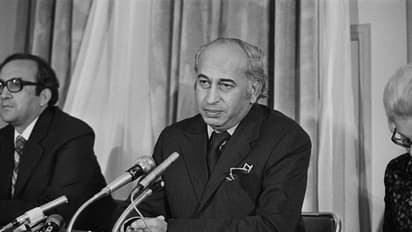Pakistan's SC says former PM Zulfikar Ali Bhutto 'not given fair trial' in 1979 death sentence

Synopsis
Zulfikar Ali Bhutto, the founder of the Pakistan Peoples Party (PPP), currently led by his grandson and former foreign minister Bilawal Bhutto Zardari, was hanged in 1979 following a trial conducted under the military rule of the late General Zia-ul-Haq.
Pakistan's Supreme Court declared on Wednesday that former Prime Minister Zulfikar Ali Bhutto, who was executed 44 years ago after being found guilty of murder, did not receive a fair trial. Bhutto, the founder of the Pakistan Peoples Party (PPP), currently led by his grandson and former foreign minister Bilawal Bhutto Zardari, was hanged in 1979 following a trial conducted under the military rule of the late General Zia-ul-Haq.
"We didn't find that the fair trial and due process requirements were met," said Chief Justice Qazi Faez Isa in remarks telecast live of the ruling that he said was a unanimous decision by a nine-member bench headed by him.
The judgment was issued in response to a judicial reference filed by Bhutto Zardari's father, Asif Ali Zardari, during his presidency in 2011. The reference requested the top court's opinion on reconsidering the death penalty imposed on the PPP founder.
"Our family waited 3 generations to hear these words," Bhutto Zardari said later in a post on X, formerly known as Twitter.
A comprehensive order will be issued by the court at a later time.
"It is an admission of a colossal miscarriage of justice under Zia's martial law regime," said Yousuf Nazar, London-based political commentator and a close aide of the late prime minister.
Rights groups assert that Haq's 11-year dictatorship was characterized by an attack on democracy, the persecution and imprisonment of PPP workers, and the public flogging of opponents and critics.
Nazar stated that the regime also fueled extremism and militancy in the conservative Muslim nation by supporting and backing militant groups to engage in a US proxy war against the then-Soviet Union in Afghanistan.
"It led to an unprecedented level of support for and patronage of religious extremists at the state level," he said.
Check the Breaking News Today and Latest News from across India and around the world. Stay updated with the latest World News and global developments from politics to economy and current affairs. Get in-depth coverage of China News, Europe News, Pakistan News, and South Asia News, along with top headlines from the UK and US. Follow expert analysis, international trends, and breaking updates from around the globe. Download the Asianet News Official App from the Android Play Store and iPhone App Store for accurate and timely news updates anytime, anywhere.